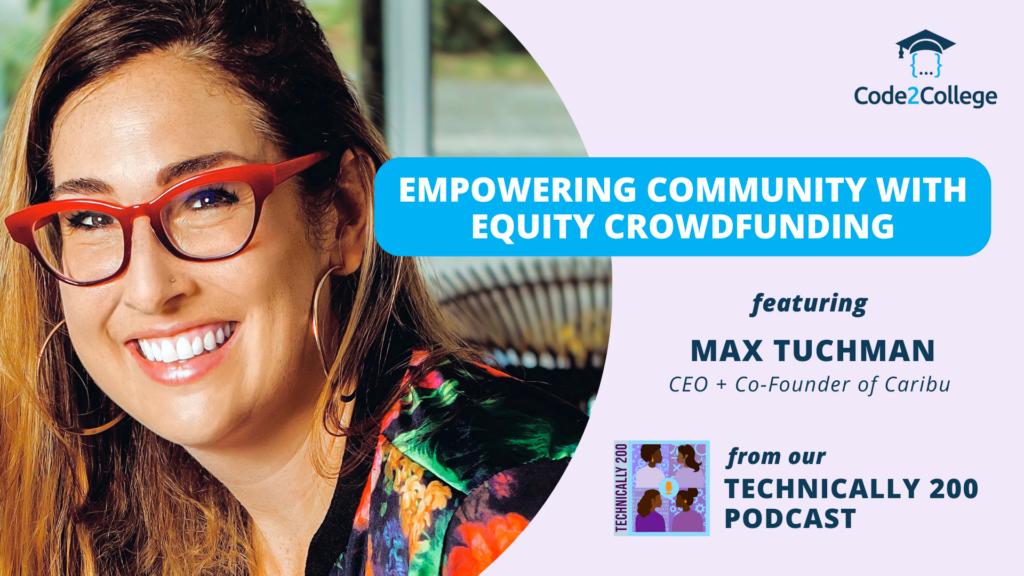We probably don’t have to say how demanding it is to found and run your own startup company. Although Max Tuchman does put it nicely: “You’re not just wearing all the hats – you’re making the hats!”
As the Founder and CEO of Caribu, the interactive video call platform for kids and families, Max Tuchman has come a long way since her early startup days. Now featured in Business Insider, The New York Times and the Today Show, she is the 59th Latina to raise over $1 million in venture funding and the first Latinx founder to raise over $1 million in equity crowdfunding.
You might be wondering, what in the world is equity crowdfunding? Why is that a big deal? We had the same questions for Max, and she was more than happy to join us on our podcast, Technically 200, to talk all things startup funding and community (and just a little bit of Kevin Jonas).
“If you read TechCrunch every day, you think that every startup is raising venture capital. But it’s not true, especially for historically ignored communities,” says Max. According to Bloomberg and Entrepreneur, only 2% of all venture capital goes to women-led startups. For women of color, that figure drops to less than 1%. As if that weren’t obvious, women who partnered with male co-founders snatched 15% of venture capital in 2017 alone. “If you’re a founder that comes from historically ignored communities, we have to come up with other ways to grow our business. This is why I love equity crowdfunding. It levels the playing field.”
Equity crowdfunding is very similar to regular crowdfunding, where you invest into a project and get a reward for that investment. Simply put, equity crowdfunding means everyday people can invest into a company and receive equity in that company (for those unfamiliar, equity is essentially the value of a company’s stock shares). Before the Jobs Act of 2012, which declared everyone had a right to invest into a company that wasn’t public, only SEC-accredited investors could gain equity in companies. Since the Jobs Act, equity crowdfunding has grown in popularity, resulting in large investment platforms like Wefunder and StartEngine, and even platforms dedicated to startups led by women and Black founders.
If you have an idea for a solution to a problem that affects a community you’re a part of, it is your moral imperative to build it.
Max Tuchman
Equity crowdfunding is a multi-faceted solution to a broad, large-scale issue. Women and BIPOC can grow their business while giving previously inaccessible financial opportunities to their communities. However, effort must be put into fostering this network, says Max. Part of that is effective marketing – communicating how your idea solves a problem that afflicts your community. For Max, the idea for Caribu was born from witnessing a deployed soldier attempting to read a story to his daughter online. Max and her co-founder saw this father struggling to balance the book and engage with his daughter, all the while the screen couldn’t effectively translate the visuals and text from the page. “It was a terrible experience,” says Max, whose co-founder agreed: “I know we can build technology better than this.”
That’s where it all began for Max. She had never run a company before, but she saw a problem in her community that she became passionate about, and knew she had an idea that solved it. Max’s biggest piece of advice to young women of color with an idea? “If you have an idea for a solution to a problem that affects a community you’re a part of, it is your moral imperative to build it. We are the best people to solve those problems because we see it and understand it.” On top of that, effectively utilizing equity crowdfunding as a means to build your idea into a business fosters a symbiotic relationship between you and your community. It’s a win-win situation – or rather, an empowerment-empowerment one.
“I could not have raised the equity crowdfunding I did if not for the community I built.” If you don’t have one, Max says, that’s nothing to worry about. “Go build it. Don’t take no for an answer, and don’t believe that there’s only one way to fund your business. Get scrappy.”
To learn how Max went from pitch competitions to the Today Show (and how Kevin Jonas fits into all this) check out her story on our Technically 200 podcast. We discuss how she navigated barriers while building her startup, her learning lessons, and additional pieces of advice to young women of color who are passionate about making an impact on the world.
